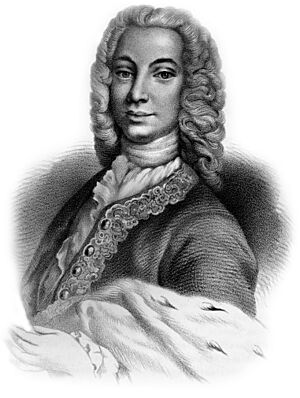Antiochus Kantemir facts for kids
Antioch Kantemir (born September 8, 1708 – died March 31, 1744) was an important figure from Moldavia. He was a smart writer, a diplomat (someone who represents their country in other nations), and a prince. He lived during a time called the Russian Enlightenment, which was a period of great new ideas in Russia. Many people call him "the father of Russian poetry" because of his important work.
Early Life and Education
Antioch Kantemir was born into a noble family in Iaşi, Moldavia, on September 8, 1708. His grandfather, Constantin, became a ruler of Moldavia in 1685. Constantin's sons, Antioch and Demetrius, were well-educated and followed him as rulers.
Antioch Kantemir was the son of Demetrius Cantemir and Princess Kassandra Cantacuzene. His mother's family claimed to be related to an old Byzantine royal family. Antioch spent some of his younger years in Constantinople (modern-day Istanbul) as a hostage. He was taught by his father and later studied at the Academy in St Petersburg. After his studies, he moved to his family's estate.
A Diplomat and Writer
Kantemir became a diplomat for Russia. From 1731 to 1736, he worked as the Russian ambassador in London, England. An ambassador is a country's top representative in another nation. After London, he moved to Paris, France, where he served as Russia's special minister.
In Paris, Kantemir became a well-known intellectual. He made friends with famous thinkers like Montesquieu and Voltaire. He died in Paris in 1744.
Kantemir's Important Works
Antioch Kantemir is often called "the father of Russian poetry" because of his influence. He used his classical education to help Peter the Great's plan to modernize and westernize Russian culture.
One of his most famous works was Petrida, an unfinished long poem that praised Emperor Peter the Great. He also wrote about old Russian poetry styles in 1744. Kantemir created many odes (poems of praise) and fables (short stories with a moral).
He helped edit his father's book, History of the Growth and Decay of the Ottoman Empire, while in England. He also wrote a biography and a list of his father's works. In 1742, he wrote a philosophical book called Letters on Nature and Man.
Kantemir is best remembered for his satires. Satires are writings that use humor, irony, or exaggeration to criticize people's foolishness or vices. His satires, like To My Mind: On Those Who Blame Education, were among the first of their kind in the Russian language.
He also translated works by famous ancient poets like Horace and Anacreon into Russian. He translated Dialogues on Light and Colors by Francesco Algarotti. His 1740 translation of Bernard Le Bovier de Fontenelle's Conversations on the Plurality of Worlds was partly censored. Kantemir's own writings were translated into French by a person named Abbé Guasco, who also wrote about Kantemir's life.
See also
 In Spanish: Antioj Kantemir para niños
In Spanish: Antioj Kantemir para niños
 | Aurelia Browder |
 | Nannie Helen Burroughs |
 | Michelle Alexander |


